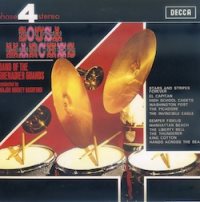 CD1 [35:10]
CD1 [35:10]
John Philip SOUSA
Marches
The Band Of The Grenadier Guards/Major Rodney Bashford
rec. 1966
First released on LP as PFS 4134
The first CD in this box, Sousa marches from Major Rodney Bashford and the Band of the Grenadier Guards, is drawn form the earlier Phase 4s, not the Concert Series. Sandwiched between Music from Doctor Doolittle and Swing is King with Ted Heath and his band it’s a bright and breezy take on the kind of repertoire made famous by Frederick Fennell and his Eastman Wind Ensemble. Mercury saw the sonic potential of this rep, and Fennell conducts Sousa is still one of the best discs in their Living Presence series.
The Band of the Grenadier Guards is the oldest and probably the best loved in the British Army, and these performances – recorded in 1966 – contain all the obvious picks from Sousa’s vast orchard. Bashford sets the tone with a brisk, somewhat efficient account of The Stars and Stripes Forever; indeed, he’s a stickler for discipline, so the programme unfolds with all the precision and symmetry of a military parade. That quick, no-nonsense approach is bolstered by the abrupt fades at the end of each track, which don’t allow the notes to linger. In fact, this is a pretty airless recording, and the spotlighting of various instruments is none too subtle either.
I daresay this audio trickery sounded good on record players of the period, but it wilts under the pitiless gaze of modern, digitised transfers. There’s no audible distortion here, but there’s very little low-end oomph either; that’s surprising for a series predicated on sonic excellence. Still, it’s quite easy to sit through the entire programme without feeling fatigued. Traditionalists will be happy with the results, although others will see this album as a quaint artefact – a fading Polaroid, if you will – when placed alongside the rich, mega-pixelled splendour of Keith Brion’s Sousa cycle for Naxos.
Mildly entertaining; not the best introduction to Phase 4.
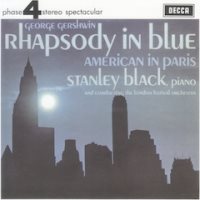 CD2 [46:59]
CD2 [46:59]
George GERSHWIN
Rhapsody in Blue,
An American in Paris,
Variations On ‘I Got Rhythm’
The London Festival Orchestra/Stanley Black
David Parkhouse (piano)
London Festival Recording Ensemble/Bernard Herrmann
rec. 1965/71
First released on LP as PFS 4098 & PFS 4280
This CD supplements Stanley Black’s Gershwin LP with the Variations on ‘I Got Rhythm’ from Bernard Herrmann’s Four Faces of Jazz. Interestingly, the audiophile label Mobile Fidelity reissued the latter as part of their prestigious Gold series (UDCD 672), so this one promises to be rather special. The Rhapsody in Blue and music from the great Minnelli musical An American in Paris are entrusted to the composer and band leader Stanley Black. As a household name in Britain Black was used as something of a bridge between the ‘easy listening’ ethos of the early Phase 4s and the ostensibly higher brow Concert Series.
That big band background is all too evident in this somewhat bloated account of the Rhapsody. The ‘ping-pong’ stereo of the opening doesn’t help; neither does the jumbo-sized piano or the shameless highlighting of instruments. Indeed, the way the latter leap out of the mix – especially on headphones - is laughable. The sound has a little more body than the Sousa disc, but there’s a ‘hot’ treble that would drive a Geiger counter into overload. The swoopy violin and the soupy orchestra are typical of the performance as a whole; Gershwin fans, beware.
Black’s larger-than-life account of An American in Paris is easier to forgive, for it captures the film’s bold primary colours very well indeed. Rhythmically the playing is more assured, and the feckless focus pulling is kept to a minimum. Even the bass has a bit more body, which helps to tame the edgy strings. Those reared on the likes of André Previn’s classic LSO version (Warner) will know how much detail is buried in this widescreen wonder; Black certainly catches the general mood – there’s real zing to the trumpets and the toe-tapping beat is unmistakable - but otherwise this is a very patchy performance.
What I miss most in those recordings is any sense of symphonic weight and thrust, qualities that make Previn’s Gershwin uniquely exciting. Herrmann is far less brash in the Variations, although David Parkhouse’s piano solos are consigned to a ‘dead spot’ between the left and right channels. Also, he’s so closely miked that one can hear the instrument’s innards clunking away; still, the performance itself isn’t bad and the sound is quite welcoming. Also, there’s just enough percussive edge to tantalise rather than irritate. As before the music is brutally faded; surely some tidying up could have been done at the re-mastering stage?
Herrmann’s Gershwin works rather better than Black’s; the Phase 4 sound is as quirky as ever.
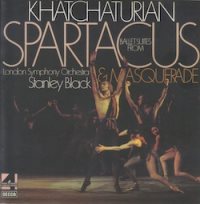 CD3 [57:20]
CD3 [57:20]
Aram Il'yich KHACHATURIAN
Spartacus (excerpts),
Masquerade (excerpts),
Gayaneh (excerpts)
London Symphony Orchestra/Stanley Black
rec. 1972/76
First released on LP as PFS 4349 & PFS 4434
After that big and blowsy Gershwin from Mr Black I approached his Khachaturian with some trepidation. These are also high-energy scores that make them obvious choices for a ‘hi-fi spectacular’; however, there’s music of melting loveliness here too, and that really doesn’t play to this conductor’s strengths. One can only hope that the LSO will bring some much-needed restraint and sophistication to the proceedings. Alas, it’s probably asking too much of the engineers to lay off the jiggery-pokery on this one.
Well, I’m happy to say these snippets from Spartacus are actually rather good; the LSO whizz through the more intoxicating music without breaking sweat and the Adagio of Spartacus and Phrygia is hauntingly done. Also, the eruptive timps – fair game in this hi-fi context – are thrilling but not overbearing. True, the balances are little exaggerated, but the quality of the playing more than makes up for that. There’s also a splendid sense of drama, of joined-up music-making, that ensures a colourful, compelling performance. The recording is much more congenial too, with a lushness not heard thus far. Even the spotlighting isn’t too crude, particularly in the rocking Dance of the Gaditanae.
Clearly, this maestro isn’t as black as I’ve painted him. The Masquerade dances aren’t quite as alluring as those from Spartacus; for instance the Waltz is a tad inflexible, and it’s short on charm. That said, the gently descending string figures of the Nocturne are a model of good taste; thankfully the engineers keep their fingers off the pots most of the time, so there’s little or no sense of the sound being pulled about. The Mazurka is nicely done – a judicious blend of body and bounce - and the Romance has a quiet charm and chained ardour that’s most appealing. The Galop has plenty of point and pulse, and the excitable brass never sound gabbled. Great fun, this, and the best thing in the box thus far.
Moving on to Gayaneh it just gets better. The sneering brass and febrile rhythms of the Sabre Dance are terrific, bringing to mind that wonderful hula-hoop sequence from the Coen Brothers’ keenly observed retro flick, The Hudsucker Proxy. What a pity, though, that the fades are as peremptory as ever. In principle Ayesha’s Dance is much too close – the volume level has jumped dramatically – and it just sounds disproportionate. The same is true of the Dance of the Rose Maidens, although those chattering brass figures are well executed and recorded. After that the hushed Lullaby seems impossibly quiet; but not for long, as the louder passages are cartoonishly large in comparison to what’s gone before. At least the wild Lezghinka yields more easily to such rough treatment.
It was all going so well until the knob-twiddlers got twitchy; otherwise this is a most enjoyable disc.
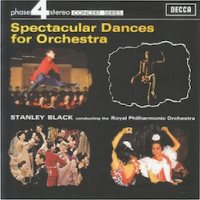 CD4 [72:23]
CD4 [72:23]
Spectacular Dances for Orchestra
Royal Philharmonic Orchestra, London Symphony Orchestra/Stanley Black
rec. 1966/69
First released on LP as PFS 4118 & PFS 4245
In an ideal world one would be loath to follow Khachaturian ballet suites with more than 70 minutes of orchestral dances. As with the Black/Herrmann Gershwin hybrid this CD’s programme is culled from two LPs, recorded three years apart. At least they share the same conductor – take a bow, Mr Black – and the same venue, the Kingsway Hall, demolished in 1998. That fabled space features on many of the recordings here. As for the present track list it’s very ‘bitty’, but I suppose it makes sense to corral these short dances into one pen.
The start of the Presto from Dvořák’s Op. 46 Slavonic Dances seems to have caught the engineers by surprise, for the music’s leading edge has been ever so slightly trimmed. What follows is arc-lit and somewhat relentless, but not as ruinously so as Strauss’s Du und Du. The latter sounds unbelievably crude, both as a performance and as a recording; indeed, it could be the ugliest thing in the box. The Russian Sailors’ Dance from Glière’s The Red Poppy isn’t far behind; it’s either muted or manic, and it’s pock-marked by those tiresome ping-pong effects. It also seems close to overload at times. Ugh.
In the 1960s that might have impressed one’s friends over Vol-au-vents and a bottle of plonk, but now it seems like cruel and unusual punishment. Moving on, Ponchielli’s Dance of the Hours might as well have been scored for hippos in the first place, such is its squat and ungainly shape here. Also, the aural trickery in Saint-Saëns’s Danse macabre is as clumsy as it gets; the performance isn’t much better, for the music’s usual contours appear to have been hammered flat. As for Alan Loveday’s violin solo it only comes in jumbo. All this talk of pachyderms isn’t coincidental, for nothing on this CD seems to come in standard sizes.
Gritting my teeth I pressed on. Brahms’s Hungarian Dance No. 5 has all the charm of a ringtone, for unlike the earlier tracks it has no shape or body at all. Not only that, Black plays fast and loose with speeds, so that the usual contrasts count for nothing. Even the playing is shockingly approximate. As for those precipitous pauses; what was the man thinking? After another savage fade we’re hurled into two dances from Falla’s Three Cornered Hat. Alas, Black has absolutely no sense of idiom, so both pieces are stillborn. At least the second of the Op. 46 Slavonic Dances (No. 8) gets a fair outing, although this time the sonic tizz has been replaced by a halo of fuzz. That same lack of precision clouds the Waltz from Act I of Sleeping Beauty, which is dispatched quickly and without elegance or feeling.
It seems this conductor is back to his cavalier ways, and that makes for a most dispiriting experience. Oddly, at the end of that waltz there’s a hint of hall ambience, which is summarily curtailed. Not such a shock really, for there’s no finesse to be found anywhere on this benighted disc. After a variously otiose and out-of-control Dance of the Tumblers from Rimsky’s The Snow Maiden Berlioz’s orchestration of Weber’s Invitation to the Dance gets a tolerable performance and recording. Thankfully the cello solo comes in regular rather than jumbo, for which we should be grateful. The Smetana is pretty decent too, although the tambourine player seems to be sitting in one’s lap. As always the comedians have the last laugh, even if their antics here are more Keystone Kops than Kabalevsky.
About as much fun as fingernails scraping a chalk board; surely it can’t get any worse than this?
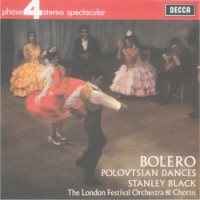 CD5 [65:06]
CD5 [65:06]
Maurice RAVEL
Boléro
Alexander BORODIN
Prince Igor - Polovtsian Dances
Nicolai RIMSKY-KORSAKOV
Capriccio espagnol
Peter Il’yich TCHAIKOVSKY
Capriccio italien
London Festival Orchestra/Stanley Black
rec. 1964
First released on LP as PFS 4048 & PFS 4055
Once more into the breach I go, squaring up to Mr Black in a selection of French and Russian showpieces. I must confess Ravel’s Boléro has long since lost its appeal for me - thank you, John Derek and Torvill and Dean - but I can still be surprised by how daring a construct it is. The Rimsky and Tchaikovsky items are rather more pedestrian, or at least they seem so after years of overexposure on the airwaves.
This Boléro starts off quite well, even if that slow accretion of colour and shape takes a while to manifest itself. There’s plenty of spotlighting here, but at least the recording isn’t fierce or overbearing. As for the playing it’s tidy enough, if a tad nondescript. It does get a little out of sync near the end, though, and the recording becomes raucous too. The Polovtsian Dances aren’t bad either – hello there, Mr Tambourine Man – but rhythmic subtlety isn’t one of Black’s strong suits. The chorus flits about the soundstage as if playing hunt the mikes, and the cumulative charge of Borodin’s score is allowed to dribble away much too easily. The sound is very compressed, too.
Rimsky’s Capriccio espagnol is slightly better than I would have expected – absurd balances and a treacly Variazioni notwithstanding – although it seems continuity of line isn’t one of this conductor’s strengths, either. At least there’s a modicum of atmosphere in this performance, albeit sporadic. Perversely, after the treble energy of previous tracks the sound on this one is ill-focused and underpowered. Weird perspectives disfigure the Fandango, which in any case is messily executed. Quelle surprise, the opening fanfares in Tchaikovsky’s Capriccio italien get the full ping-pong treatment; thereafter this celebration of Mediterranean vigour turns into a dreary, foot-dragging affair – what pallid percussion – that’s not helped by scrappy playing.
The debit side of the ledger looks rather ominous; let's hope for some much-needed credits in Part 2.
Dan Morgan
Introduction & Full Boxset Listing



 All Nimbus reviews
All Nimbus reviews








